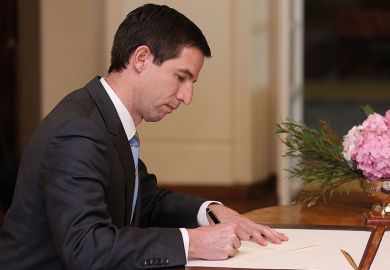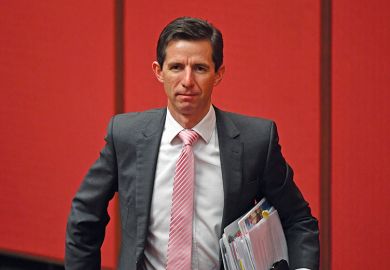Australian universities have welcomed the government’s commitment to greater transparency around research grant decision-making, but have warned that plans to introduce a new national interest test could prove counterproductive.
In the wake of widespread anger over former education minister Simon Birmingham’s secret vetoing of funding for 11 humanities research projects, his successor, Dan Tehan, proposed the introduction of the national interest test to “improve the public’s confidence in taxpayer-funded university research”.
Mr Tehan said that he had also asked the Australian Research Council to ensure that applicants were notified when their projects had been endorsed by the council “but not funded by the minister”. In the case of Mr Birmingham’s vetoes – covering projects worth A$4.2 million (£2.3 million) – the grants were recommended for approval for by the ARC but applicants were reportedly led to believe that they had not survived the peer review process.
However, the Innovative Research Universities mission group warned that making research projects pass a “national interest” bar could prove counterproductive.
“If all research funded is to be narrowly targeted at an immediate problem or outcome, then we will undercut our future,” executive director Conor King said.
Mr Tehan said the new test would apply to all future grant rounds funded through the ARC.
“The value of specific projects may be obvious to the academics who recommend which projects should receive funding, but it is not always obvious to a non-academic,” he said.
“If you’re asking the Australian taxpayer to fund your research you should be able to articulate how that research will advance the national interest.”
Andrew Norton, higher education programme director at the Grattan Institute, said that ARC research grant criteria already contained national interest provisions.
For example, the 2018 funding rules for Discovery Programme grants include selection criteria such as “does the research address a significant problem?” and “will the proposed research maximise economic, environmental, social, and/or cultural benefit to Australia?”.
Mr Norton said the government’s proposal could backfire, encouraging research proposals in areas with no obvious applications. “Any vague ‘national interest’ criteria will be even easier than the current criteria to interpret in ways that let ARC assessors choose projects on largely academic grounds,” he said.
The National Tertiary Education Union said it was sceptical about the test. “How will this differ from the current situation where applications are required to articulate outcomes and national benefits?” asked NTEU president Alison Barnes.
“How much extra time and effort will researchers and their universities spend trying to massage applications to highlight national interest rather than the intrinsic value of the proposal? This looks very much like an attempt to deflect attention away from Senator Birmingham’s botched attempts to justify his unwarranted interference.”
Dr Barnes also said that a commitment to disclose ministerial vetoes of grants was inadequate, insisting that the minister must also commit to publishing the reasons for such decisions.
Shadow science minister Kim Carr said Mr Tehan’s national interest proposal was “just an attempt to spin his government’s way out of trouble on its arbitrary decision-making”.
“A national interest test already exists,” Mr Carr said.
Register to continue
Why register?
- Registration is free and only takes a moment
- Once registered, you can read 3 articles a month
- Sign up for our newsletter
Subscribe
Or subscribe for unlimited access to:
- Unlimited access to news, views, insights & reviews
- Digital editions
- Digital access to THE’s university and college rankings analysis
Already registered or a current subscriber?








